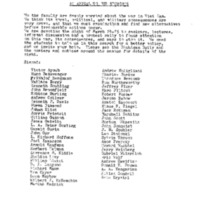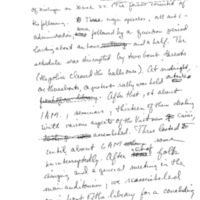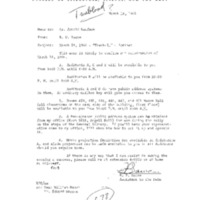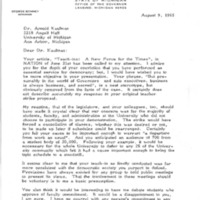Browse Items (7 total)
- Collection: The First U of M Teach-In (March 1965)
Sort by:
Gamson Clip interview in 1965 and interview in 2015
Professor Gamson is interviewed by WXYZ in 1965 and is asked to explain the idea of a "work moratorium." In 2015, he ironically unveils he did not have Friday classes, therefore, there was not much at stake.
Professors at U of M ask students to support the first teach-in on March 24-25th, 1965
U of M professors wanted students to become aware of U.S. foreign policy in Vietnam by attending the March 24-25th, 1965. "We need the students to help us in this search for a better policy, and we invite your help."
Arnold Kaufman handwritten notes about the 1965 teach-in
Professor Kaufman outlines the events that occurred at the 1965 U of M teach-in. He gives details regarding the thought behind creating a teach-in that only presented "one side" of the argument.
Bill Gamson at the Teach-in +50: War on the Planet
Professors organizing the disruption had to switch from a "work moratorium" to a "teach-in." "Disrupting business as usual", was a phrase reiterated by many professors as they reflected on the formation of the concept "teach-in."
Confirming booked rooms for the teach-in that occurred in Angell Hall March 25-26th, 1965
Administration began to cooperate with faculty organizers of the teach-in after they switched from the idea of a work moratorium. Gamson states, in a panel discussion at the Teach-in +50: War on the Planet, the administration helped them book rooms.
Governor George Romney responds to Professor Kaufman's Nation article about the teach-in.
Governor Romney responds to Professor Kaufman's Nation article about the teach-in because Kaufman criticizes Romney for disagreeing with the event. Romney took offense to this criticism and wanted to clarify his support for open discussion presented…
Sahlins interview clip; "Students first learned that their professors were people ..."
Many students did not see the political interests of their professors until the first teach-in. In Professor Sahlin's opinion, this made professors seem more relatable.
About these items
Insert text here about the archives, etc.




